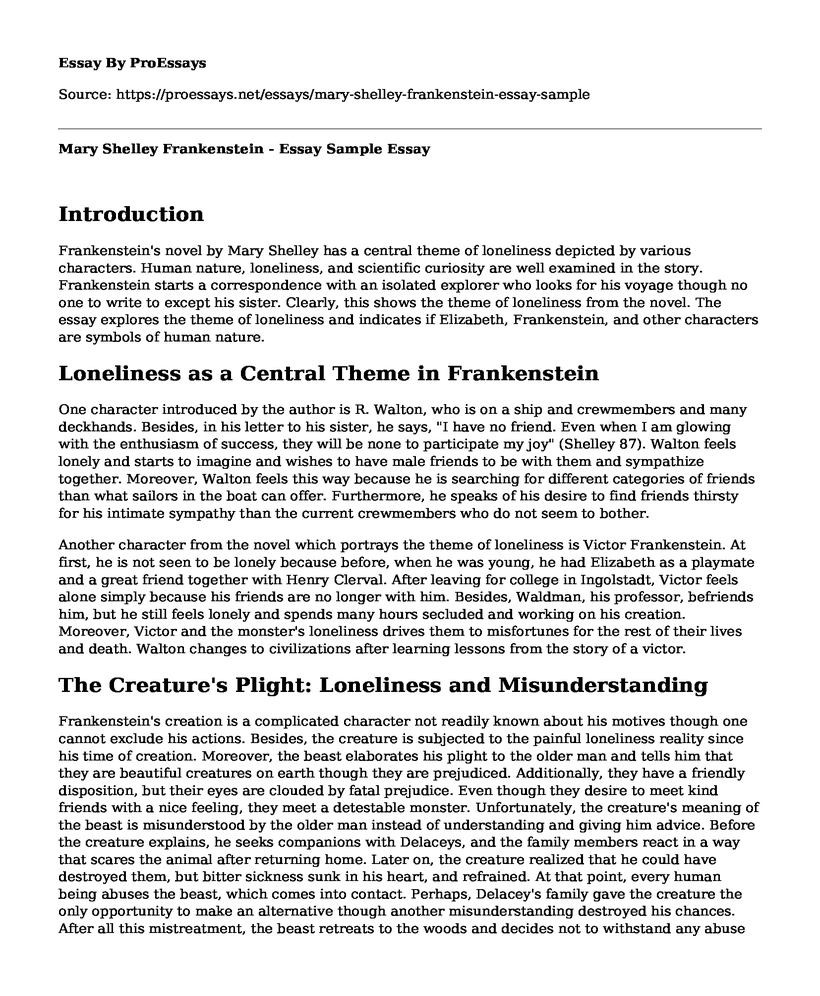Introduction
Frankenstein's novel by Mary Shelley has a central theme of loneliness depicted by various characters. Human nature, loneliness, and scientific curiosity are well examined in the story. Frankenstein starts a correspondence with an isolated explorer who looks for his voyage though no one to write to except his sister. Clearly, this shows the theme of loneliness from the novel. The essay explores the theme of loneliness and indicates if Elizabeth, Frankenstein, and other characters are symbols of human nature.
Loneliness as a Central Theme in Frankenstein
One character introduced by the author is R. Walton, who is on a ship and crewmembers and many deckhands. Besides, in his letter to his sister, he says, "I have no friend. Even when I am glowing with the enthusiasm of success, they will be none to participate my joy" (Shelley 87). Walton feels lonely and starts to imagine and wishes to have male friends to be with them and sympathize together. Moreover, Walton feels this way because he is searching for different categories of friends than what sailors in the boat can offer. Furthermore, he speaks of his desire to find friends thirsty for his intimate sympathy than the current crewmembers who do not seem to bother.
Another character from the novel which portrays the theme of loneliness is Victor Frankenstein. At first, he is not seen to be lonely because before, when he was young, he had Elizabeth as a playmate and a great friend together with Henry Clerval. After leaving for college in Ingolstadt, Victor feels alone simply because his friends are no longer with him. Besides, Waldman, his professor, befriends him, but he still feels lonely and spends many hours secluded and working on his creation. Moreover, Victor and the monster's loneliness drives them to misfortunes for the rest of their lives and death. Walton changes to civilizations after learning lessons from the story of a victor.
The Creature's Plight: Loneliness and Misunderstanding
Frankenstein's creation is a complicated character not readily known about his motives though one cannot exclude his actions. Besides, the creature is subjected to the painful loneliness reality since his time of creation. Moreover, the beast elaborates his plight to the older man and tells him that they are beautiful creatures on earth though they are prejudiced. Additionally, they have a friendly disposition, but their eyes are clouded by fatal prejudice. Even though they desire to meet kind friends with a nice feeling, they meet a detestable monster. Unfortunately, the creature's meaning of the beast is misunderstood by the older man instead of understanding and giving him advice. Before the creature explains, he seeks companions with Delaceys, and the family members react in a way that scares the animal after returning home. Later on, the creature realized that he could have destroyed them, but bitter sickness sunk in his heart, and refrained. At that point, every human being abuses the beast, which comes into contact. Perhaps, Delacey's family gave the creature the only opportunity to make an alternative though another misunderstanding destroyed his chances. After all this mistreatment, the beast retreats to the woods and decides not to withstand any abuse anymore.
Conclusion
In the end, Frankenstein Victor dies with his wish in mind that he could destroy the monster he made. Later on, the beast visits Walton and tells him that he regrets all the killings committed, and he wishes to commit suicide. Moreover, the creature made Victor isolate himself and felt hopeless when he realized that he made the living creature who killed his family members and great friends. Besides, in the end, the essay argues that the beast Frankenstein is no longer the monster. Instead, society and Victor are the ones who are monsters in the story.
Work Cited
Shelley, Mary Wollstonecraft. Frankenstein: The 1818 Text. Penguin, 2018. https://books.google.co.ke/books?id=tU5ODwAAQBAJ&printsec=frontcover&dq=Shelley,+Mary+Wollstonecraft.+Frankenstein:+The+1818+Text.+Penguin,+2018.&hl=en&sa=X&ved=2ahUKEwiMpITV7PLrAhUDzoUKHeI-AG4Q6AEwAnoECAIQAg#v=onepage&q&f=false
Cite this page
Mary Shelley Frankenstein - Essay Sample. (2023, May 19). Retrieved from https://proessays.net/essays/mary-shelley-frankenstein-essay-sample
If you are the original author of this essay and no longer wish to have it published on the ProEssays website, please click below to request its removal:
- Analyzing the Duke Vincentio in Shakespeare's Measure for Measure
- Paper Example on Youth Mental Health in Canada
- Critical Essay on Use of Racial Slurs in the Adventures of Huckleberry Finn
- MSI Form Description Paper Example
- Essay Sample on Psychology: A New Science Explored
- The Character Analysis of Hector in Homer's Iliad Essay Example
- Risk of Bullying in Children With ASD: Investigating Predictors - Annotated Bibliography







